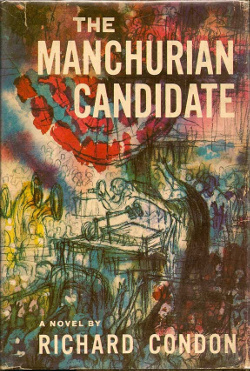
The intersection of crime and politics has made for some superb suspense fiction—and lately, some lurid headlines. After all, the stakes couldn’t be higher: war and peace, tyranny vs. freedom. Although I’ve written several suspense novels, I had never written a political novel before Presidents’ Day, my most recent book. But I’ve always been fascinated by politics, today more than ever. So it seemed inevitable that eventually I’d set a novel in the world of politics.
In writing Presidents’ Day, I wanted to use the suspense genre to explore the true levers of power in America. The novel’s protagonist—Julian Mellow, a billionaire investor—believes that Washington is merely the back-office to New York, where true power lies. (I swear I began this novel long before the last election cycle!) Presidents’ Day puts this idea to the test.
What makes a good political novel? Some of the best books of the genre give us an insider’s look at politics, making us feel that we’re peeking behind the curtain where the decisions that affect our lives and our futures are made.
Primary Colors by Joe Klein was a wonderful example of this. Though not, strictly speaking, a crime novel, this very funny book nevertheless kept us turning the pages to see if the candidate was going to “get away with it”—in this case, not an actual murder but the behind-the-scenes shenanigans of a presidential campaign. The fact that Primary Colors was not-so-subtly based on the actual campaign of Bill Clinton and yet still managed to keep us in suspense as to the outcome only underscores the author’s achievement.
Primary Colors played on our most salacious suspicions about the cynicism and depravity of contemporary politics. Quite a few political thrillers exploit even darker fears. Among the best of these is House of Cards by Michael Dobbs, the British novel written nearly thirty years ago that was adapted into a Netflix series and an earlier, even better BBC series.
Dobbs has written that he was inspired to write the novel after the hard-fought 1987 election that brought Margaret Thatcher to power. The book was inspired by a straightforward question: how do you get rid of a Prime Minister? Interestingly, the very week the BBC series was first broadcast, Thatcher was forced out of power. As will undoubtedly happen to any American author writing political fiction in the era of Donald Trump, fact had overtaken fiction.
 If Primary Colors and House of Cards explore the levers of power within the political system, a novel like The Manchurian Candidate by Richard Condon exploits our fears of outside influences on the system. Published in 1959 and twice adapted as a film, it’s a political thriller about the son of a prominent U.S. family who is brainwashed into being an unwitting tool for a hostile country. (Once again, novelists may be more prescient about politics than actual journalists.)
If Primary Colors and House of Cards explore the levers of power within the political system, a novel like The Manchurian Candidate by Richard Condon exploits our fears of outside influences on the system. Published in 1959 and twice adapted as a film, it’s a political thriller about the son of a prominent U.S. family who is brainwashed into being an unwitting tool for a hostile country. (Once again, novelists may be more prescient about politics than actual journalists.)
The Manchurian Candidate shares with House of Cards and even Primary Colors the notion that government is less about a system than about the devices, desires, and failings of individuals. There’s a built-in sense of terror in this notion that we citizens are all at the mercy of a single fallible (or infallible but evil) person. No wonder it’s the starting premise of so many great political thrillers.
Few would describe Being There, Jerzy Kozinski’s 1970 satirical novel, as a thriller. Published in 1970, Being There is about a dim-witted gardener who becomes a sought-after political pundit and commentator on the vagaries of the modern world and, eventually, a potential American president. The suspense comes not from any sense of literal menace, but from the idea that, once again, our entire political system is vulnerable to the influence of a deeply limited, deeply flawed individual.
We often hear, today more than ever, that our democracy is stronger than any one person. But in political suspense, the opposite is most often true: our system is no match for one power-mad or, in the case of Being There, intellectually limited, individual.
Given recent political events, it’s tempting to conclude that the political thriller is irrelevant; what could possibly top the events of the past year? And yet readers everywhere are more unsettled by government and the people who govern them than ever before. So I suspect political thrillers, which play on our hopes as well as our fears about our leaders, are here to stay.
Read an excerpt from Presidents' Day!
To learn more or order a copy, visit:
Seth Margolis lives with his wife in New York City and has two grown children. He received a BA in English from the University of Rochester and an MBA in marketing from New York University’s Stern School of Business Administration. When not writing fiction, he is a branding consultant for a wide range of companies, primarily in the financial services, technology and pharmaceutical industries. He has written articles for the New York Times and other publications on travel and entertainment.

Thank you Mr. Margolis for your recommendations, especially as you note, the ” recent ” electionS, both in U.S. and U.K.